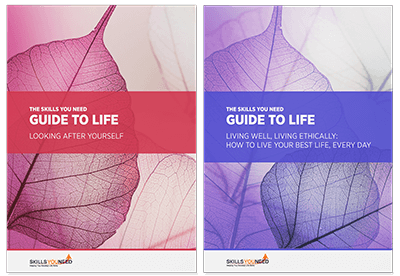11 Effortless Ways to Take
Mental-Care of Yourself
See also: Coping Skills
Taking care of your mental health is an essential aspect of our daily life, but we can start to neglect this if we get too busy or feel unworthy of it. You must however take some time to recharge your batteries and focus on your own needs every now and then to continue to be the rockstar you already are.
Here are some effortless ways you can make that happen.

1. Talk to Someone
Humans crave personal connections with others. Talking isn’t a sign of weakness; it can actually be a very effective way to cope with a problem. Just being listened to can help you feel less alone. To help you open up, try and let the conversation develop naturally - maybe when you’re talking about past experiences or your day. If you feel you have no one to talk to, try and seek counseling. There are plenty of free counselors that are willing and able to help you.
2. Stay Active
Experts believe that exercise releases feel-good chemicals in your brain that boost self-esteem, help with concentration, and allow you to sleep better. Exercise doesn’t mean you need to spend an hour playing sports; merely walking for 30 minutes five days a week can give you the full benefits of a workout. Try to make physical activity a part of your day by incorporating more movement. For example, every 2 hours walk around your workspace or office building.
3. Start Adding Flowers to Your Home
Did you know that flowers have incredible powers? Studies show that flowers can help heal the common cold, improve mood, aid in relaxation, increase our energy and improve our memory. Not all flowers will give you the same healing properties, however. Still, if you grab one of Bouqs special flower arrangements filled with roses, lavender, and echinacea, you can deoxidize the air while giving yourself a quality sleep. Just place them near your bed, coffee table, or office desk.
4. Quiet Your Mind
Research shows that quieting your mind will help you feel calm and enhance the spiritual effects of therapy. Try adding a daily meditating, mindfulness, or prayer practice every morning to kickstart your day. Meditating can help us feel optimistic about the present because it asks us to focus on the now through breathing techniques. Mindfulness is a significant stress reducer that limits creeping thoughts of the future or the past, which will benefit your mental health significantly.
5. Break up Monotony
You may have noticed that every day bleeds into one another, especially when you have commitments you can’t break, like work or running errands. Routines are efficient at making us feel safe and secure, but a change of pace can lighten a tedious schedule. Instead of watching television after work, you can try a new restaurant, try a new exercise routine, or take a walk in a different park. Any change can heighten a typical day and improve our mindset.
6. Go Back to the Nostalgic
There are plenty of psychological benefits related to nostalgia, including stress reduction, improving empathy, happiness, and our connection with other people. You likely already have nostalgic memories associated with a place, person, or an item like a book or a movie. When you’re feeling down, play your favorite song, a video game, or a movie that gave you joy when you were younger. Being wistful of the past typically makes us more optimistic about the future.
7. Drink Some Water
Being dehydrated, even mildly, can contribute to anxiety, low energy, nervousness, and depression. Being dehydrated also throws off our dopamine and serotonin balances, which are the chemicals that affect depression and anxiety. Sometimes taking a big swig of water can be exactly what your body needs to feel energized again. If you’re having trouble getting your daily water intake, invest in a giant jug and tick off how much water you should drink each hour.
8. Take a Nap
If you can’t get enough sleep at night, take a 30 minute or 1-hour nap to reduce your overall stress levels. Taking a nap can rejuvenate you and help you feel more active and aware, but there is also evidence that suggests napping boosts memory, lifts your mood, and improves job performance. As long as napping doesn’t produce night-time sleep problems, it’s okay to seek a dark place with a comfortable blanket and catch some much-needed rest.
9. Turn Off Your Phone
Social media and the demands of others can affect our mental health negatively. In fact, heavy social media use can increase anxiety, depression, and loneliness in healthy people. If you feel that the time you spend on your phone makes you feel inadequate or upset, take time away from it by turning your phone off and placing it out of the room. Take this time to do something you enjoy, like meditating, staying active, or indulging in something nostalgic.
10. Light Candles
The soothing effect of candles is well documented because our sense of smell is directly linked with our memories. The limbic system, or the part of your brain that processes memory and emotions, can be useful for regulating our emotions. The feel-good chemicals dopamine and serotonin can activate if we smell something that reminds us of a positive experience. Even one lit candle in our office space can improve your day in a big way.
11. Play with a Dog or Cat
If you have a dog or cat, go pet and play with them. Being around an animal will lower stress hormones, protect against anxiety, help us feel needed, and increase our self-esteem. You can truly be in the moment with your pets because your sole focus is on them. However, if you don’t have a pet, ask your friends if you can interact with theirs or visit a cat cafe. You may not want to visit a shelter or adoption center while upset because you may adopt a pet on the spot!
Further Reading from Skills You Need
The Skills You Need Guide to Life
This two-part guide is an easy-to-read summary of the essential skills you need for a healthy mind and body.
The first eBook, Looking After Yourself, covers some of our most popular content and will help you to live a happier, healthier and more productive life.
The second eBook, Living Well, Living Ethically, considers how you can live your best life all the time. It helps you to answer the question: how can I avoid having too many regrets about my life?
About the Author
Cristina Par is a content specialist with a passion for writing articles that bridge the gap between brands and their audiences. She believes that high-quality content plus the right link building strategies can turn the tables for businesses small and large.


